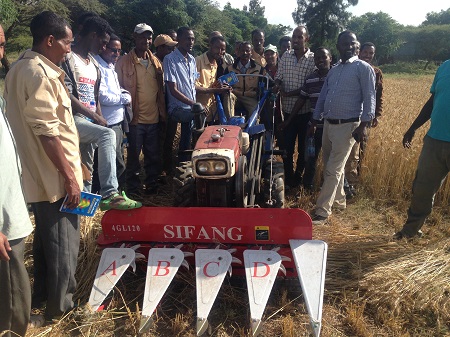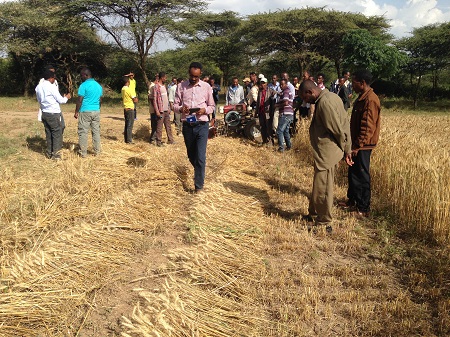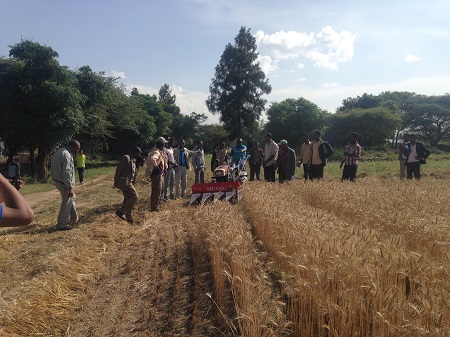 The project, titled “Appropriate Mechanization for Sustainable Intensification of Smallholder Farming in Ethiopia,” aims to increase soil fertility through direct row planting of major crops in Ethiopia, such as maize, wheat and teff. However, they identified in their pilot phase that the necessary infrastructure and supply chains were not in place to ensure project sustainability and that the involvement of the private sector would be necessary.
The project, titled “Appropriate Mechanization for Sustainable Intensification of Smallholder Farming in Ethiopia,” aims to increase soil fertility through direct row planting of major crops in Ethiopia, such as maize, wheat and teff. However, they identified in their pilot phase that the necessary infrastructure and supply chains were not in place to ensure project sustainability and that the involvement of the private sector would be necessary.
Therefore, the project in its second phase focused on these critical activities, especially increasing capacity of service providers to deliver services and manage their businesses, and mechanics who closely support service providers in their daily business. Mechanics work with the local spare parts representatives identified by AMIO Engineering Plc, a local private sector partner in manufacturing and dealer of small scale agriculture technologies and machinery, to ensure that the fast moving and critical parts are always available in stock at their local warehouses.
In October 2017, two trainings were conducted at the Ethiopian Institute of Agricultural Research (EIAR) in Melkassa.
The first training was organized for selected mechanics by AMIO and CIMMYT with funding from the Integrated Soil Fertility Management program (ISFM), part of the German Cooperation for International Development Agency (GIZ). The one-week training covered the use and function as well as maintenance, repair and spare parts of the two-wheel tractor (2WT).
 The second training, intended for service providers (SPs), focused on capacity building and quality development of small-scale mechanization services. The 44 SPs in attendance were encouraged to exchange individual experiences and expertise about service provision businesses, technical challenges in the field and the extent of potential business opportunities.
The second training, intended for service providers (SPs), focused on capacity building and quality development of small-scale mechanization services. The 44 SPs in attendance were encouraged to exchange individual experiences and expertise about service provision businesses, technical challenges in the field and the extent of potential business opportunities.
These trainings specifically focused on the use, operation, maintenance and safety of the 2WT and its ancillaries, as with correct aggregation almost all farming tasks can be accomplished with a single machine. The use of a 2WT for these tasks reduces both the time required to establish a crop and the chore of the task, by increasing productivity of both labor and crops.
Economic assessments show that mechanized planting using a 2WT is an economically viable and attractive option for both farmers and SPs. This is especially true when services offered include full use of 2WT and attachments; as these services are useful 365 days a year.
After farmers see these technologies, they are often interested in purchasing the services associated with the equipment and service providers frequently asked to procure additional equipment.
 In order to achieve the aim of increased soil fertility through direct row planting of major crops in Ethiopia, the project selected six micro-watersheds in January 2016 that corresponded to ISFM intervention sites to test the delivery of small mechanization through service provision. The sites are located in the regions of Amhara, Oromia and Tigray.
In order to achieve the aim of increased soil fertility through direct row planting of major crops in Ethiopia, the project selected six micro-watersheds in January 2016 that corresponded to ISFM intervention sites to test the delivery of small mechanization through service provision. The sites are located in the regions of Amhara, Oromia and Tigray.
The project imported six equipment packages from China for mechanized crop establishment, harvesting of small grain cereals and water pumping. These machines were loaned to individual service providers in Oromia and Tigray, and to a farmers group in Amhara. In addition, EIAR locally manufactured six trailers and three threshers which have been be dispatched to service providers.
Furthermore, in this second phase, the GIZ-ISFM through CIMMYT with Ethiopia’s Ministry of Agriculture and Natural Resources (MoANR) dispatched 100 units of 2WT with plows, and an additional 15 trailers and 18 direct row planters that can be attached.
Based on encouraging results, the second phase of the project will focus on establishing viable, private sector-based input delivery mechanisms (maintenance and repair services, spare parts, and new equipment) and generating sufficient demand for self-sustained scaling-out processes.
 Capacity development
Capacity development 
